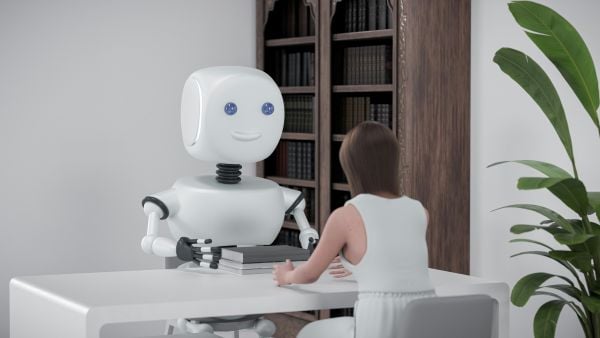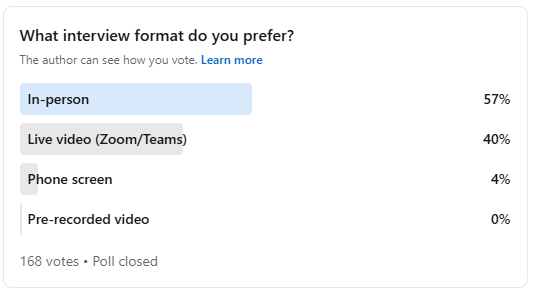How employers conduct job interviews is evolving. Modern technology, video, and AI are having a big impact on ways you can identify, recruit and assess potential candidates. This is true of Executive Search in Toronto, and it applies to all job types and industries.
There is no question that the future of job interviews will differ from their current iteration. But before we look ahead, it’s important to look at the current state of things. In this blog, we’ll discuss our recent poll about preferred job interview formats and then speculate about the potential impact that video and AI will have on the interview process.
Learn about:
- What is the preferred job interview format today?
- The current state and future of video job interviews
- How AI tools will change the job interview process forever
What is the preferred job interview format today?
The pandemic certainly threw a wrench into the job interview process, let alone everything else in our lives. Companies were forced to make the switch to video interviews. But now that we are back to normal, many companies have moved back to in-person interviews.
Even though in-person remains the gold standard, our recruiters believe that as time passes, live video interviews will become just as common.
What’s your preference? We asked our LinkedIn audience what interview format they prefer. The Poll results were clear. People still prefer in-person. 57% of respondents still prefer in-person to video (40%) and phone (4%).
The current state and future of video job interviews
For effective preliminary engagements, video conferencing is highly valuable. Nonetheless, nothing quite replaces the importance of face-to-face meetings for both job seekers and hiring managers.
Top-tier employers that value talent acquisition will integrate both strategies. Conducting initial interviews virtually ensures convenience for candidates and internal stakeholders alike, particularly within companies featuring remote or geographically dispersed workforces. This accessible and streamlined approach facilitates rapid narrowing down to a final shortlist of prospects.
Research finds that 82% of companies use virtual interviews, and 93% plan to continue using them. Video has become popular because it offers so many benefits:
- It can speed up the recruitment process.
- You can reach candidates who are geographically dispersed.
- It simplifies the logistics of holding interviews.
- It’s cost-effective.
There is no question that video job interviews will continue to increase in popularity among employers. So, job seekers will need to work on their video skills to ensure they are prepared to put their best foot forward in a virtual environment.
How AI tools will change the job interview process forever
While it’s clear the impact video is having on the job interview process, the impact of AI is less obvious. The technology is still in its infancy, and many employers are still trying to figure out how to best implement AI tools. But some early adopters are already leveraging AI for interviews.
Pavithra Mohan from Fast Company summarizes how companies are using AI for job interviews currently:
“The survey also found that some companies—23%—already rely on AI to conduct interviews, and that another 19% are planning to start doing so within the next year. That can include using AI to ask interview questions, analyze body language, or transcribe interviews. In fact, according to the survey, 24% of companies currently use AI for the “entire interview process,” and that number is projected to increase to 29% by the end of 2025.”
For the next couple of years, candidates should expect a blend of AI-powered tools and human interaction, with AI handling tasks like resume screening and initial interviews, while human recruiters focus on deeper assessments of skills and cultural fit. Here are some considerations employers and candidates must account for as interviews evolve with AI:
- More Standardization: Interviews may become more consistent across candidates, reducing the “gut feeling” element and increasing fairness.
- Human + AI Collaboration: AI won’t replace human judgment but will enhance it, offering better data and saving time for deeper human interaction.
- Ethical Concerns: Questions around privacy, data use, and bias will need careful oversight. Transparent and ethical use of AI in hiring will be essential.
AI is poised to make the job interview process faster, fairer, and more skills-focused — but its effectiveness will depend on how well it’s implemented and monitored.
A final word about the future of job interviews
The job interview process is undergoing a major transformation, driven by advancements in video technology and artificial intelligence. While in-person interviews remain the preferred choice for many, video interviews have secured a lasting place in the recruitment process due to their convenience and efficiency.
Looking ahead, AI will play an increasingly influential role in how employers screen, assess, and engage with candidates. As these tools continue to evolve, companies will need to find the right balance between technology and the human touch. The future of interviews will be defined by how well organizations blend innovation with thoughtful, ethical hiring practices, ensuring a process that is not only more efficient but also fairer and more inclusive for everyone involved. Check out our Ultimate Job Interviews Guide for more.
More From Our Executive Search Team About Job Interviews
The 6 Best Interview Moments in Movies
5 of the Toughest Interview Questions & How to Crush Them
Ultimate Job Interviews Guide for Candidates & Employers: 103 Insights for Successful Interviews






